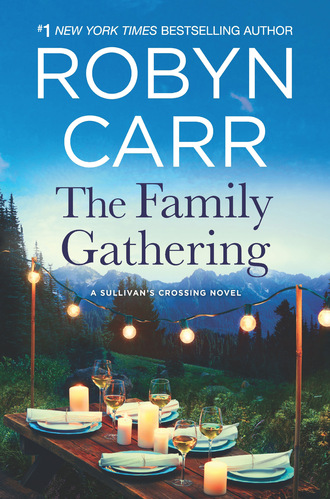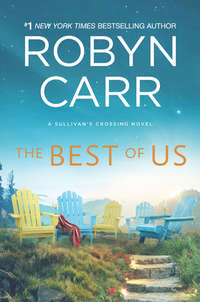
Полная версия
The Family Gathering
But he noticed things. She wore very nice clothes—knee-high boots and a brushed-leather skirt. A red sweater that showed off a nice figure. A shawl rather than a jacket. Her watch was expensive looking but he was no expert on women’s jewelry. She had model-quality makeup. And the nails...
If this woman had walked into the officer’s club, he’d have beat everyone to the front of the line to buy her a drink. But here, he just didn’t.
They had a pleasant, meaningless conversation. Sid took his plate, refilled his Coke and put his bill on the bar. Neely took a few more bites of salad and then blotted her lips, looked at her watch and said, “Well, I’m off. Late again.” She fixed her black wrap around her shoulders and stood. “Hey, I have an idea. I have a reservation for one for dinner tonight. A very interesting and cozy little restaurant in Aurora—Henry’s. I’d be pleased to make it for two. Let me take you to dinner as a welcome-to-Colorado gesture. And maybe we’ll get to know each other better.”
“That’s very nice of you,” he said, not standing. “I’m afraid I have plans tonight. But thank you.”
She very confidently turned over the receipt for her lunch, popped out a pen and scribbled on the back. The name of the restaurant and her phone number. Also, 7:00 p.m. “Sometimes plans change,” she said, and then she winked at him.
Really, she winked. This was a moral dilemma. She was sex waiting to happen. He wasn’t above that.
Sid was suddenly standing in front of him. “Can I get you anything else?”
“You were right about the burger,” he said. “Outstanding.”
“You had a good lunch, then,” she said. It wasn’t a question.
“It was the most interesting one in Timberlake so far.”
“Oh?” she said, raising her tawny eyebrows.
“You’re not fooling me,” he said. “You heard every word.”
“Oh, of course I didn’t,” she said. “I never do!”
“You’re full of shit, Sid,” he said, grinning. He threw some bills on the bar and told her to keep the change. And he left Neely’s receipt on the bar.
Dakota had a very productive afternoon. He checked on Sully, did a little restocking for him, had coffee with old Frank, who was like a fixture at the store, and saw Sierra when she came by the Crossing to see if she was needed for anything.
“Want to come to dinner tonight?” she asked him. “It’s just me and Molly. I’m thinking grilled cheese and a chick flick.”
“Oh God, that’s so hard to pass up,” he said. “I’m going to take my chances on Cal’s big screen. There has to be something on. Or I could read...”
Sully snorted.
“Hey, I can read!”
“I’m sure you can,” Sully said.
“I guess that was a no,” Sierra said.
“If you want me to come over, I will,” he said.
“As a matter of fact, I enjoy my nights alone with the dog,” she said. “I’m just looking out for you.”
“As a matter of fact, I do okay on my own, too,” he said. But he kissed her forehead in a very sweet big-brotherly fashion.
At six thirty he entered the bar and grill in Timberlake and sat up at the bar. It was only moments before Sid saw him. She pleasured him with a sly half smile. She put down a napkin in front of him. “You’re going to be late.”
“For what?” he asked, showing her his megawatt smile.
“Dinner at the chichi restaurant, which isn’t Henry’s by the way. It’s Hank’s. And it’s expensive. She was buying, you idiot.”
“She winked at me,” he said. “I was terrified.”
She threw her head back, her strawberry blond ponytail rippling in time to her laughter. “I bet you were torn,” she said when she stopped.
“Okay, truth, I thought about it for a second. But my experience is, that is not a good sign. If it’s that bold, it’s loaded. With trouble.”
She shrugged. “I couldn’t tell you. I don’t know anything about her.”
He grinned at Sid and it was completely genuine. “You are such a liar.”
“And what can I get you?” she asked.
“A beer. Whatever is on tap.”
“Are you having anything to eat with that?”
“No. I’ll be thinking about food with my next beer. I bet you see and hear some stuff in here.”
“Oh, no, you don’t,” she said. She served him up a beer. “I had to sign a confidentiality agreement to work here. Your priest isn’t as safe as I am.”
“Cocky,” he said. “You hear a lot of jokes, don’t you?”
“Yes,” she said. “I’m even learning to tell a few. I have to practice in front of the mirror.”
“I bet you don’t,” he said with a laugh. “I’m very experienced in talking to bartenders and you’re not what you seem.”
“I can assure you, I’m exactly what you see,” she said.
“Okay, what did you do before bartending?” he asked.
“Don’t you think that’s a little personal?” she returned.
“No,” he said, shaking his head. “Unless you were in the Secret Service or something.”
“If I was, I wouldn’t be able to tell you.”
“If you were, you’d have a cover,” he said. He disarmed her with his smile.
“I worked in computers,” she said. “Very dull. In a room without windows. Figuring out programs and stuff. It’s what everyone in California is doing these days. What did you do in the Army?”
He leaned back, almost satisfied. “I mostly trained to go to war and then went to war. My last shift was Afghanistan. And that’s when I decided I’d rather pick up trash.”
“Really? That sounds like a dramatic change.”
“Maybe,” he said. “Do you know a guy named Tom Canaday?”
“Sure. I know Tom. Everyone knows Tom.”
“I met him. Hell of a nice person, Tom. He’s had all kinds of jobs, being a single father and all. He said roadwork, refuse pickup and plowing in winter pay very well and have great benefits. He said he still works for the county part-time.”
“You weren’t kidding about picking up trash,” she said. And then her cheeks turned a little pink.
“Aha! I knew it! You never miss a thing!” He laughed at her.
“How’d you meet Tom?” she asked.
“If I tell you, promise not to tell your other customers?” She put a hand on her hip and just glared at him. “He did some work for my brother. My brother had a remodeling job and Tom helped.”
“Well, that makes sense,” she said. “Tom has worked all over this valley. He even did some work in this bar.”
Dakota looked around. “I don’t know what he did but it’s a good-looking bar. Now back to you. Why’d you trade computers for bartending?”
She sighed. “Rob, my brother, is also a single father. His wife died and their kids were very young. So, he changed his life, moved here with the boys, bought this bar and it worked for him. He has some good employees so his schedule is flexible—he can leave someone else in charge and be available for the boys. They’re fourteen and sixteen now and active. But then his manager gave notice and quit and he needed help right about the same time I wanted a change. Who better than Aunt Sid? And, as it turns out, I like this.” She flung an arm wide. “I now have windows and everything.”
“Really different, though, isn’t it?” he asked.
“About as different as picking up trash will be from going to war,” she said.
He drank a little of his beer. “Got me there,” he said. “In my case, that could be a refreshing change.”
“Did you ever find yourself married?” she asked him.
He gave her a perplexed look. “As in, you wake up one morning and find yourself married? No, that never happened to me. Did you ever find yourself married?”
“I’m divorced,” she said. “Over a year now.”
“I’m sorry,” he said.
She looked at him with a slightly sad or sheepish smile. Then she gave a nod. “Incoming,” she said, and turned away to wait on someone else.
“Well, what a coincidence,” Alyssa said. He saw her reflection in the mirror and turned toward her. She put her hand on the chair beside him. “Are you waiting for someone?” she asked.
Dakota was amazed at how quickly Sid could sneak away. She was all the way down at the other end of the bar. “No,” Dakota said.
“All right if I sit here?” she asked.
“Sure,” he said. “Of course. Can I buy you a drink?”
“That would be so nice,” she said, fluffing her hair. “What have you been doing with yourself?”
“Nothing much,” he said. “Looking around. You?”
She laughed brightly and he knew. He was being stalked. There must be a real shortage of men around here. This wasn’t something that happened to him with regularity—women coming on to him. It happened, but not often. What was more common was him coming on to them. He certainly couldn’t complain about their looks, the two women who’d hit on him since he’d arrived in town. Alyssa was gorgeous. She was probably five-ten and her silky hair screamed for a man’s hands. And those legs, so many possibilities there.
She began to describe her day of styling hair, laughing at her own stories.
“Hi, Alyssa,” Sid said. “What can I get you?”
“A glass of merlot? Whatever label you like.”
“Coming right up,” she said, turning away.
Dakota was disappointed. He enjoyed a little good-natured bantering with a woman who was capable of giving it back. Alyssa was very sweet and polite, nothing about her put him off. He asked her what she did for fun. She liked to shop. Did she ski in winter? “Sure, everyone skis. Do you? Is that what brought you to Colorado?”
“As a matter of fact, I do, but I’m no expert. What else do you do for fun?”
She liked to get together with friends. Sometimes they went to Denver, clubbing. Three of them, single girls, went to Las Vegas for a long weekend; now, that was a blast. Talk about hangover city.
A couple of uniformed troopers came into the bar, sat at the end and Sid brought them coffee without being asked. They had her laughing her head off in no time. She put in their dinner order and went right back to them. She seemed to have a lot to say to them, laughing and gesturing with her hands. She refilled their coffee.
“Did you hear me?” Alyssa asked.
“I’m sorry,” he said. “I was distracted by the cops.”
“I said, maybe we should go out sometime. What do you like to do?”
Crap, he thought. “Let me get a little settled first. I’m new around here, remember.”
“I could help with that,” she said.
“And I appreciate that, Alyssa.”
A man in a plaid shirt brought out a couple of plates from the kitchen and went behind the bar, taking them to the cops. He put a hand on Sid’s shoulder and they all laughed together. The brother, Dakota thought. They reminded him a little bit of himself and Sierra; you could feel the bond between them.
“Are you wanted or something?” Alyssa asked him.
“Huh?”
“I said, are you wanted? Do you have warrants? Because you can’t take your eyes off the cops.”
“God, I’m sorry,” he said, running a hand down his face, over his beard. “I was wondering what it would take to get on the police force. Highway patrol, maybe. A lot of military men end up in the police department or fire department. I might not be that smart but I’m definitely in shape.”
“Oh, I bet you’re very smart,” she said.
“So, tell me how you chose your career,” he said, then inwardly cringed. He really wanted to run for his life. He was a bad person. She was just being nice; he should be flattered. But he wanted her to go away so he could talk with Sid.
“Ready for another beer?” Sid asked.
“Thanks, but...” He looked at his watch. “I’m going to have to go.”
“No dinner?” she asked with a devilish curve to her lips.
“Not tonight, I’m afraid.” He stood to dig out his wallet. “You take good care of the police,” he commented.
“Absolutely. They return the favor.”
“Take care of me and Alyssa here. Keep the change. Alyssa, you staying?”
“No, I’ll walk out with you,” she said.
He put a hand on her elbow to escort her out and asked her where her car was. At the beauty shop, of course. He prayed: please don’t try anything. Wasn’t that upside down? Didn’t normal men want beautiful women to try things? Anything? But this was a real small town and he had no follow-through here. He took her keys from her, beeped her doors unlocked and nearly pushed her into the car.
“There you go,” he said with finality. “I’ll see you real soon, okay?”
“Okay,” she said, clearly disappointed in him.
“Drive carefully!”
He plunged his hands in his pockets and sauntered back toward the bar to get his vehicle. Ah, that was how Alyssa knew! She could see the bar and grill from the salon; she could see his Jeep. He got in and started the engine. Then he sat there a minute. He thought about driving around the block a couple of times, then going back. He thought about just sitting there for a while, waiting for when Sid got off work. To do what? Follow her home? “Argh,” he growled, disgusted.
Then he asked himself two questions. One—what was it about Sid that was threatening to turn him into a creep? And two—did Cal have anything in the refrigerator he could eat?
The happiest moments of my life have been
the few which I have passed at home
in the bosom of my family.
—THOMAS JEFFERSON
3
SID ENJOYED WALKING home from the bar. It was nine, it was a brisk spring night and she’d put in a full, long day. She rarely stayed until closing; one of the other waitresses and Rob could manage behind the bar with the dwindling clientele. She left the weekends to the men and more energetic women. She typically worked Monday through Thursday but was willing to fill in here and there when needed. And, of course, her brother being the owner, she had good benefits.
The bar had saved her life. Well, Rob had saved her. And now she was schlepping drinks and meals and everyone was her friend. From introverted mathematician to gregarious barkeep. She didn’t know she could be this happy.
The new guy, Dakota, was a cocky one. He knew he was good-looking; she’d seen his type before and stayed far away from them. He downplayed it even though he had women crawling all over him. What was he doing? Playing hard to get? Letting the women make fools of themselves while he enjoyed the attention? If she could trust any man she might take the time to understand him. But she would only get to know as much of Dakota as could be learned with a nice big bar separating them.
She trusted one man only—her brother. Rob was the strongest, most genuine man she knew. When she was about to die of a broken heart, he came for her.
It had been a dark, desolate time. Without warning, her husband left her for another woman. They’d been together seven years; she’d put him through medical school and supported him through his residency, and when he was done, he left her. He’d been with the other woman for two years, he’d said. She had never suspected.
That wasn’t how it was supposed to be. They’d had plans. After residency he’d study for his boards, and right after passing the boards, they were going to have a baby. They hoped to have three. She thought they were in love, but while he was intimate with Sid, he was making promises to another woman. She knew they didn’t have sex very often, but wasn’t that how marriage and familiarity worked out? They talked about their future family. Was she remembering right? Was it just Sid who’d talked about their future? With her brain constantly riddled with equations, she often missed things happening right in front of her. Friends called her the absentminded professor. When David left, he had no lingering med school debt—no debt of any kind. That course of events had happened often enough that it was considered an old story—one spouse supports the other through a tough program like med school, then they divorce. It was such a cliché.
But Sid hadn’t had a clue. She should have known he didn’t love her. She should have felt it. But she herself was overworked, putting in long, long hours at the lab, drowning in data to be analyzed and sorted. She’d only been married seven years and was already grateful when David just left her alone so she could either work or rest.
She was in shock for a few months. Paralyzed with disbelief. Rob was her only family and he was struggling to raise two beautiful boys alone. They were getting by; she was so proud of them. As far as she knew, Rob didn’t date at all. But Rob had the boys. Sid had no one.
She didn’t tell anyone at work, but then her work friends weren’t social friends. They’d go out for a late-night drink sometimes after putting in a particularly grueling week; sometimes they’d have a meeting over breakfast or lunch. There was no girlfriend to call and cry to. It was different for a bunch of brainiacs. They were mostly introverts. Sid was one of the few who had a slightly social side to her personality but she could be content focusing on her work, living inside her head. Her husband had been so busy with residency she hadn’t expected much of a social life, anyway. Once he left her, she realized they rarely went out with friends, and when they did, they were usually doctors or hospital staff.
She moved through her days in a fog, going to work, writing papers, delivering lectures on quantum computing, managing a specially trained staff on UCLA’s DNA computing analysis. It seemed they were always close to a breakthrough—no time to relax, no time to play around—a quantum computer that sorted and analyzed DNA in a split second and made chromosome projections could change the world, eliminate birth defects, cure diseases. They worked off several huge government grants and contributions from foundations and patrons. They worked on tight deadline after tight deadline.
She was pretty far up the chain, on the top rung of a notable research team with only two PhDs above her. People brought their problems to her. She could hardly go to Dr. Faraday and have a breakdown and get personal advice. He was grooming his work for a Nobel Prize.
She had been very well compensated, of course. She made enough money to pay for their medium-size LA home, David’s medical school, five years of residency, her own advanced education, living expenses and, in seven years, two vacations.
She didn’t talk about her marriage, or rather her divorce. Throw a bunch of computer programmers and analysts in a room and they don’t tend to talk about their feelings.
One of the interns, a woman, noticed Sid was losing weight and seemed tired. Dr. Faraday asked her if she was getting sick. “Because we can’t afford to have you get sick.” She told him she was having some personal issues with her marriage, but she wasn’t specific and he dropped it like a hot potato.
Sidney began to suspect David had never loved her, had never been faithful, and she was too busy and too inexperienced in things like romance and relationships to see the signs. She remembered his opening line to her. “I saw an article about you in the LA Times—young physicist making waves in quantum computing.” He probably thought cha-ching. Meal ticket.
David began the divorce proceedings immediately. After all she’d done to support him he wanted half of everything they had accrued—half the savings, half the house, half of her pension! He was going to take everything she had and she’d be forced to start over. She should have found her own attorney at once but Sidney couldn’t move. She couldn’t function. She couldn’t get out of bed. Her students and coworkers emailed but she didn’t open the computer. They called her but she didn’t answer the phone. She didn’t answer the door. It was her elderly neighbor who had watched the house once when she visited Rob who’d unearthed his phone number and called him.
“Is Sidney there with you?” she had asked.
“With me? No! I’ve left her a couple of messages and she hasn’t returned my calls, but Sidney gets like that sometimes. If she gets really busy at the university, she just doesn’t pay attention.”
“Ever since David left her—”
“What?” Rob had shouted into the phone.
“You didn’t know? She didn’t want to talk about it but I’m so worried now. She’s been getting so thin, looking so wounded. I haven’t seen her in days and she won’t answer the door. I’m afraid she’s done something to herself. Her husband hasn’t been around. And she didn’t say she was going away.”
“Good God, call the police! Break down the door. Please make sure she’s in there, that she’s all right. I’ll be on the next plane.”
By the time Rob arrived Sid had been taken to the hospital by ambulance. An IV replaced fluids so she wasn’t dehydrated any longer, and she’d been medicated. But mentally and emotionally, she was ruined. Rob sat on the edge of her bed, took her hand in his and said, “Sid, what were you trying to do?”
It took her a very long time to speak. At long last, she said, “I don’t know. I didn’t know what to do.”
She felt she had failed so monumentally she couldn’t move. It wasn’t just that her marriage didn’t work; it was that she could be so successful in her field and not even notice her marriage didn’t work.
He pulled her into his arms and they wept.
Her doctors wanted to keep her in the hospital—in the psych ward. But Rob worked with them to find a good facility in Colorado. She needed medication and therapy. Rob brought Sid into his home after a brief and healing stint in the hospital, got her set up with a therapist. He hired a lawyer to represent Sid and helped her work through her divorce. Day by day, hour by hour, she got back on her feet. It wasn’t easy; it wasn’t quick.
Sidney had never been very emotional and she certainly wasn’t a romantic. She was a scientist, a pragmatist, living in a world of equations and computations. But now she knew how dangerous a broken heart could be. And she learned how awful having no family, no real emotional bonds, could be.
She had had an emotional meltdown and what she learned was so ridiculously simple she felt even more stupid. She had not been living a balanced life. She had been completely absorbed in difficult work, had been physically tired, had no love in her life, became isolated and her defenses were down.
She collapsed.
Rob brought her into the bar, at first to lend a hand or have a meal with the boys. Eventually she worked her way into the business, getting to know the patrons, becoming friends with the other employees, getting to know the people in the town. Now it was her lifeline.
She still lived with her brother and nephews. She and Rob worked together to make sure the boys had everything they needed and the full support of parental figures. Sean and Finn were smart, athletic and funny. College was on the horizon.
“We’re going to turn into one of those odd brother and sister couples who no one understands and who live into old age together without changing anything,” Sid joked.
The town didn’t know all she’d been through. She was divorced, as were many people. They only knew a little of what Rob had been through, burying a young wife when his sons were only six and eight.
There was one thing that continued to plague her. How could her ex-husband treat her with that kind of selfish cruelty, use her as he had, abandon her the way he did and sleep at night? She tried not to think about that too much; it made her too sad. She was not known as a sad person. She was well liked and considered to be bright and funny and helpful.
There were plenty of attractive, personable men in Timberlake. She’d even been asked out. Could she ever be friends with a man again? She thought probably not.
But she took an oath. She was never going to let herself be that isolated and overworked again. She planned to surround herself with family and friends. Casual friends, not lovers.
* * *
By the time Cal got back from Denver, Dakota had signed his rental agreement, moved in his meager belongings and been hired by the county to haul trash part-time, starting in ten days. There would be a few days of training first, though how one trained in picking up garbage eluded him. He hoped they’d let him drive the big truck.








